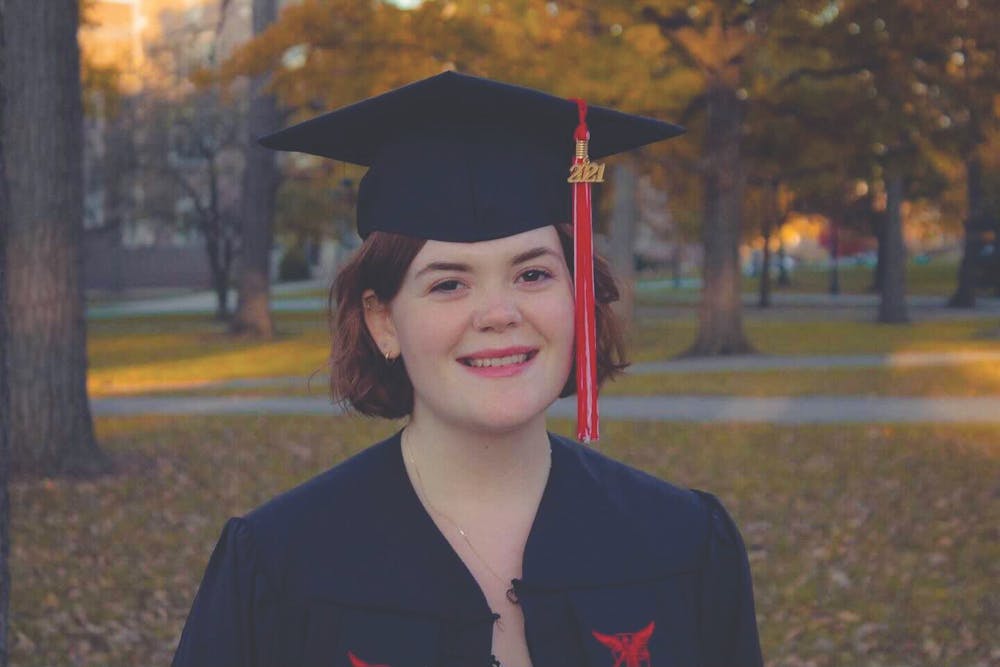Likelihood of having a bachelor’s degree
Adults with at least one parent with a bachelor’s degree: 70%
Adults with no parents with a bachelor’s degree: 26%
Students who have at least one parent with a college education are almost twice as likely to go onto obtain bachelor’s degrees themselves than first-generation students.
Source: Pew Research Center
Set to be the first person in her family to graduate with a college degree, Lauren Kamykowski, senior political science and French double major, has learned every first-generation college student faces their own challenges “that impede their academic success in one way or another.”
Kamykowski, who plans to walk at the fall 2021 commencement ceremony Dec. 18, said one of the biggest challenges of her college career hasn’t been related directly to her academics but rather handling her financial aid processes, such as Free Application for Federal Student Aid (FAFSA).
“I had no idea what I was doing when I was filling that out, and I had no insight into what financial benefits there really were for me that I can access,” Kamykowski said. “Thankfully, Ball State specifically was one of the schools that I was applying to that made it really well-known what scholarships I was applicable to and which ones I could apply for.”
Applying for college is a challenging process for first-generation students because they are sometimes unsure if they fill out applications correctly, said Breana Enyeart, senior legal studies major and first-generation student.
“I needed a lot of outside help, so just talking to admissions a lot, talking to my teachers at the time when I was in high school, talking with my coaches, talking with friends just about how the whole application process goes,” Enyeart said, “because my parents didn’t know because they didn’t go to school.”
Prior to coming to Ball State, Enyeart said she had many questions for those helping her submit applications. She said she noticed how other students applying for college didn’t keep as close of a relationship with their high school advisers as she did.
“I just didn’t have any idea what to do,” Enyeart said. “I had no direction, no guidance necessarily. I tried to keep a really close relationship with my adviser because, again, I didn’t know what I was doing. I didn’t know if the way that I was doing it was correct, [and] I was unfamiliar with a lot of the stuff that goes on in college.”
Kamykowski said she tried to release her application-induced stress by sharing it with her parents but realized no matter how much she shared with them, they were unable to give her helpful advice for college.
“Just not really having anyone to talk to about the process because my parents would lend an ear when I wanted to vent about how stressful it was but they had absolutely nothing to give me in terms of, ‘Well, you could just do it this way’ or, ‘This is what I did,’” Kamykowski said. “I think people really underestimate how helpful it is to have a parent or a sibling who’s been there [and] done that when you’re going into this process because it can be really stressful for sure.”
Though some first-generation students can feel pressure to succeed, Kamykowski said, being the family trailblazer can be motivating, too. She said she saw the opportunity to go to college as a privilege and realized she needed to “make things work,” as she didn’t want to let her family down.
“I’d say one of the biggest motivators was definitely the fact that I was the only person in my family who had ever done this before,” Kamykowski said. “There was definitely still a lot of pressure put on me from my family to be the one to graduate with my degrees, go into a really high-paying field and being successful.”
Enyeart said she noticed both positive and negative aspects in the experience of being a first-generation college student but said she wouldn’t want to change anything she had to go through to get to where she is today. The experience she faced helped her understand what kind of person she wants to become moving forward.
“I think it has been a great experience,” Enyeart said. “I have learned a lot about myself, as well as just what’s necessary in order for me to be successful. I’ve become very determined to reach all of my goals. No matter what I have to do for it, I always told myself I will never let a financial situation hold me back from what I want to do.”
Although so many challenges in college can be viewed as a setback, Kamykowski said, she keeps herself grounded by recognizing how far she’s come, along with seeing all the hard work she’s put into her education.
“At times, it can be hard to appreciate what I’ve had to do to get here just because of that, but sometimes, I could definitely sit back and think, ‘Wow, I did that. I made it through. Not only am I finishing my degree, but I’m getting two and getting it in three and a half years instead of four,’” Kamykowski said. “That was a hard thing, and I did it largely by myself. And so, [I have] mixed emotions for sure, but pride is definitely one of them.”
Enyeart said she thinks the most important thing to remind a first-generation student is “to be proud of yourself.”
“Embrace the opportunities that you have,” Enyeart said. “If you’re going through something that’s tough, just embrace all the opportunities and just be thankful for any opportunity that could come your way — good or bad — because it’s always a learning experience.”
Contact Angelica Gonzalez Morales with comments at agonzalezmor@bsu.edu or on Twitter @angelicag_1107.





